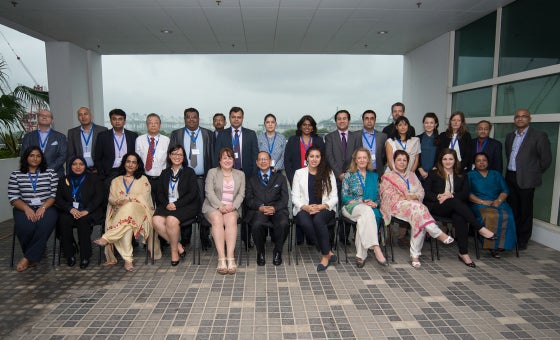
| Event Title: | ISAS – Global Center on Cooperative Security (GCCS) Workshop |
| Topic: | Strengthening Rule of Law-Based Responses to Terrorism and Violent Extremism in South Asia: What Role for Civil Society? |
| Date/Time: | 04 December 2014 | 00:00 - 00:00 |
| Venue: | MEI Conference Room |
| Speaker/s: | Multiple Speakers |
| Description: | South Asia has suffered from a significant degree of violence due to longstanding political conflicts, with groups espousing a range of causes, including national self-determination, ethno-nationalist separatism, left- and right- wing politics and religious extremism. In particular, there has been a dramatic increase in terrorist and violent extremist activities in South Asia, with over 13,000 incidents since 2002. The Global Terrorism Index has also ranked three countries in South Asia among those with the highest incidence of terrorism – Pakistan, Afghanistan, and India. This increase reflects the nature of contemporary terrorism, which has contributed to the changing rhetoric and scope of the security challenge in South Asia. Terrorist and violent extremist groups have exploited cross-border ethnic and cultural ties, common historical experiences, globalized financial and commercial networks, and new communication platforms to increase their reach and influence beyond the local to the national, regional, and even international levels. In addition, widespread development challenges, porous borders, and weak governance in many areas have exacerbated the terrorist threat regionally. The increasingly regional scope of the terrorist threat underscores the critical importance of developing a comprehensive regional approach to terrorism and violent extremism – one that is both preventive and responsive, and undertaken by a wide range of actors, including from development, security, governance, and peacebuilding. Among this approach is countering violent extremism (CVE), which aims to reduce the appeal and recruiting capacities of terrorist groups, and strengthening community resilience in the face of violent extremism. CVE involves a wide range of initiatives including developing messaging and communication campaigns to counter the violent extremist ideologies and narratives, training for law enforcement officials, heightening CVE awareness among civil society groups, and building the capacities of financial, criminal justice, and rule of law institutions. Rule of law-based institutions, in particular, have a critical role to play in preventing terrorism and countering violent extremism as negative experiences with law enforcement and other state officials, for example, can contribute to grievances and create an enabling environment for extremist groups to recruit support. Civil society actors have a particularly valuable role to play in efforts to strengthen rule of law efforts to counter terrorism and violent extremism and strengthening community resilience through advocacy, training, and enhancing the delivery of security services. They can also provide information, analyses, and training to law enforcement officials, as well as play a monitoring role regarding law enforcement measures and be powerful advocates for civil and political rights. Within South Asia, civil society has played an important role in many areas spanning the security and development spectrum, including human rights, government accountability, education, family planning, gender empowerment, and conflict prevention. In many cases, civil society organizations have served to monitor governments and law enforcement to ensure greater responsiveness and transparency. This workshop, organized by the Global Center on Cooperative Security, the Institute for Inclusive Security (IIS), and the Institute of South Asian Studies (ISAS), with support from the government of Norway, aims to further explore the role of civil society in strengthening and supporting rule of law-based institutions in their efforts to prevent and counter terrorism and violent extremism in South Asia. The workshop is intended to provide a platform for regional experts and practitioners, civil society members, and officials with the opportunity to exchange insights, experiences, lessons learned, and good practices and explore existing gaps in strengthening rule of law-based institutions to address these threats, with a view to increasing regional security cooperation. |
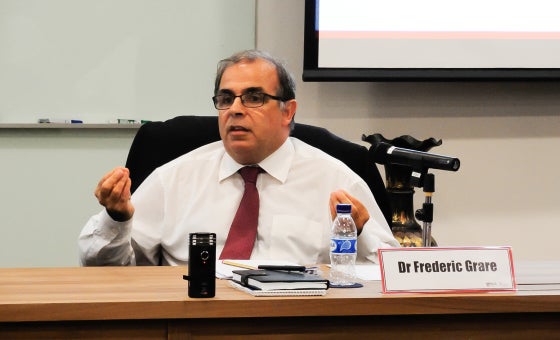
| Event Title: | Seminar |
| Topic: | Revisiting IndiaÔÇÖs Look East Policy: India-China Relations in Asia |
| Date/Time: | 03 December 2014 | 00:00 - 09:39 |
| Venue: | ISAS Board Room |
| Speaker/s: | Dr Frederic Grare, Senior Associate & Director, South Asia Program Carnegie Endowment for International Peace |
| Description: | Initiated in the early 1990s, IndiaÔÇÖs Look East Policy (LEP) no longer aims exclusively at attracting foreign direct investment from ASEAN countries in which capital is abundant. As a more secure and self-confident India has emerged as a major player in Asia, the concept has broadened geographically and substantively. Although it keeps ASEAN as its core, it now encompasses East Asia (including China) and Australia, and includes a substantial strategic component. The LEP has become a truly multipronged policy with economic, political and strategic dimensions. Yet the LEP is still a work in progress which takes place in a context characterized by the permanent race a race between the development of IndiaÔÇÖs indigenous, economic, political, military and administrative capabilities and the ongoing power shifts in Asia. |
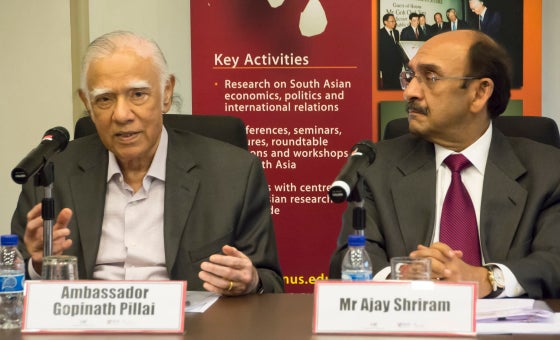
| Event Title: | CII-ISAS CEO Roundtable |
| Topic: | Diaspora in Business and Society |
| Date/Time: | 27 November 2014 | 00:00 - 09:39 |
| Venue: | MEI Conference Room |
| Speaker/s: | Amb Gopinath Pillai,Mr Ajay ShriramSumit Mazumder, Jamshyd Godrej, Chandrajit Banerjee, N Kumar, Sanjay Kirloskar, Rajan Navani, DNV Kumar Guru |
| Description: | The Confederation of Indian Industry (CII) works to create and sustain an environment conducive to the development of India, partnering industry, Government, and civil society, through advisory and consultative processes. CII is a non-government, not-for-profit, industry-led and industry-managed organization, playing a proactive role in India's development process. Founded in 1895, India's premier business association has over 7200 members, from the private as well as public sectors, including SMEs and MNCs, and an indirect membership of over 100,000 enterprises from around 242 national and regional sectoral industry bodies. CII charts change by working closely with Government on policy issues, interfacing with thought leaders, and enhancing efficiency, competitiveness and business opportunities for industry through a range of specialized services and strategic global linkages. It also provides a platform for consensus-building and networking on key issues. Extending its agenda beyond business, CII assists industry to identify and execute corporate citizenship programmes. Partnerships with civil society organizations carry forward corporate initiatives for integrated and inclusive development across diverse domains including affirmative action, healthcare, education, livelihood, diversity management, skill development, empowerment of women, and water, to name a few. The CII theme of ÔÇÿAccelerating Growth, Creating EmploymentÔÇÖ for 2014-15 aims to strengthen a growth process that meets the aspirations of todayÔÇÖs India. During the year, CII will specially focus on economic growth, education, skill development, manufacturing, investments, ease of doing business, export competitiveness, legal and regulatory architecture, labour law reforms and entrepreneurship as growth enablers. With 64 offices, including 9 Centres of Excellence, in India, and 7 overseas offices in Australia, China, Egypt, France, Singapore, UK, and USA, as well as institutional partnerships with 312 counterpart organizations in 106 countries, CII serves as a reference point for Indian industry and the international business community. |
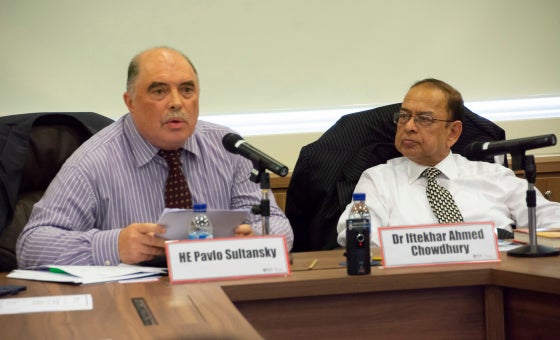
| Event Title: | ISAS Ambassador’s Lecture Series |
| Topic: | The situation in and around Ukraine: Implications for Asia |
| Date/Time: | 27 November 2014 | 00:00 - 09:39 |
| Venue: | ISAS Board Room |
| Speaker/s: | H.E. Pavlo Sultansky, Ambassador of the Ukraine to Singapore |
| Description: | Ukraine has never been spoken about as much as it has been recently if not for the Russian aggression after the Ukrainians ousted the corrupt regime during the Revolution of Dignity or Maidan uprising. Kremlin’s denial of Ukraine’s European perspective resulted in an illegal annexation of the Autonomous Republic of Crimea, armed invasion in the eastern Donbas, comprehensive support to the terrorist militants from heavy weaponary to advocacy in the UN Security Council (UNSC). Subsequently the Russian Federation being a nuclear power and a Permanent Member of the UNSC undermined the key principles of international law, neglected its international commitments and set an undesirable precedent for relations with the smaller and weaker neighbouring states. The so called “Russian world” ideology that justified Moscow’s offensive policy, was a theoretical construct which has evolved into brutal reality, posing a global threat. It is unimaginable that millions of people in Russia had consented to an act of aggression that deprived another nation from its sovereign right to choose its own way of life. Does this type of assertiveness extend beyond Russia’s neighbouring countries? Are there any implications of the “Russian world” game for relations between smaller and bigger nations in Asia? Across Asia, nations were indifferent to the Ukrainian crisis until the MH17 tragedy took place. It has changed since then. Moscow strives to replace the power of rule with the rule of power posing a grave threat to our small world, where Ukraine stands at the forefront. |
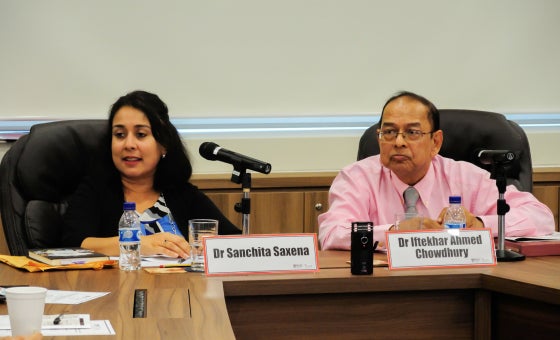
| Event Title: | Seminar |
| Topic: | Made in Bangladesh, Cambodia, and Sri Lanka: The Labor Behind the Global Garments and Textiles Industries |
| Date/Time: | 24 November 2014 | 00:00 - 09:39 |
| Venue: | ISAS Board Room |
| Speaker/s: | Ms Sanchita Saxena, Executive Director, Institute for South Asia Studies; Director, Chowdhury Center for Bangladesh Studies, UC Berkeley |
| Description: | The general perception of the garment and textile industry in the global South is fueled only by images of dismal labor conditions and unsuitable factories, descriptions of labor clashes with police, and analyses of low wages and exploitative multinational corporations. This book presents an insightful perspective on the garment and textiles industries in Asia by highlighting that an industry fraught with competing concerns can, in fact, collaborate and work together when it is in the interest of both the state and interest groups to do so. This comparative study recognizes the role of both the state and interest groups in the policy making process and argues that they are interlinked and require one another for sustainable reforms. Employing original, in-depth research in three different countries, the study skillfully delves down deep beyond the macro statistics and commonly held images to cast light on some of the significant policy and attitudinal shifts that have occurred in this industry. By analyzing the garment sector through the lens of domestic coalitions, Made in Bangladesh, Cambodia, and Sri Lanka: The Labor Behind the Global Garments and Textiles Industries presents new and innovative ways of conceptualizing the garment and textiles industries that include the possibility for change and resistance from a vantage point of cooperation among key groups, rather than only contention. Dr. Saxena has conducted more than a hundred interviews with key informants, several focus groups with eighty-five garment factory workers, as well as quantitative surveys of a hundred garment workers in Bangladesh, Cambodia, and Sri Lanka to establish several important insights about this early stage of domestic coalitions in these countries. First, the changing role of labor marked by its entrance into the coalition is itself significant in these countries where the network has been historically shut out to labor groups. Second, the study demonstrates that various types of channels and mechanisms, both institutionalized and non-institutionalized, are essential to ensure the representation of labor groups and their influence on policy change in the industry. Third, the book expertly delinks the concepts of ÔÇ£improved labor conditionsÔÇØ and ÔÇ£worker empowerment,ÔÇØ by arguing that one should not assume that better labor conditions automatically translate into an empowered workforce. Finally, Dr. Saxena comes to a critical conclusion that change and improvements stemming from top-down programs, though they may be initially effective in improving basic standards, do not help in furthering coalitions with labor groups and institutionalizing their role in policy making. This study puts the entire sector into the larger context of international trade policy; effects of decades of import quotas set the context at the beginning of the book while current trade policies impacting the garment sector, are discussed at the end. Dr. Saxena convincingly argues that the sector and the incentives of those who depend on it cannot be understood without this larger context in which the sector has flourished and ultimately survived, and all of these elements combined are essential to understanding the complexities of the garment and textile industries |
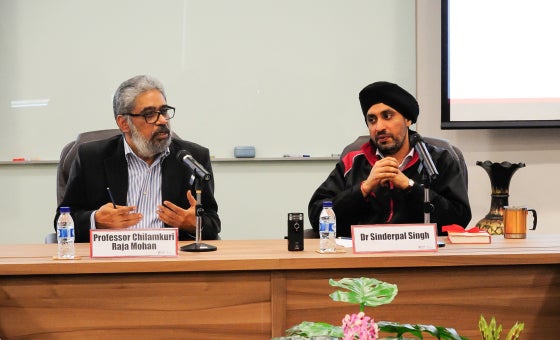
| Event Title: | Seminar |
| Topic: | Modi's World: The New Pragmatism in India's Foreign Policy |
| Date/Time: | 20 November 2014 | 00:00 - 09:39 |
| Venue: | ISAS Board Room |
| Speaker/s: | Prof C. Raja Mohan, Visiting Research Professor, ISAS, NUS |
| Description: | Prime Minister Narendra Modi, who has had little experience in foreign policy before he took charge, has surprised India and the world with an intense focus on diplomacy. In engaging the neighbours as well as major powers, Modi has brought a new vigour and pragmatism. Although Modi has not departed from the fundamentals of the foreign policy he has inherited from Dr. Manmohan Singh, he has discarded many of the inhibitions that constrained India's foreign policy in the UPA years. Major tests, however, await Modi as he explores new ways to manage the complex relations with Pakistan and China. |
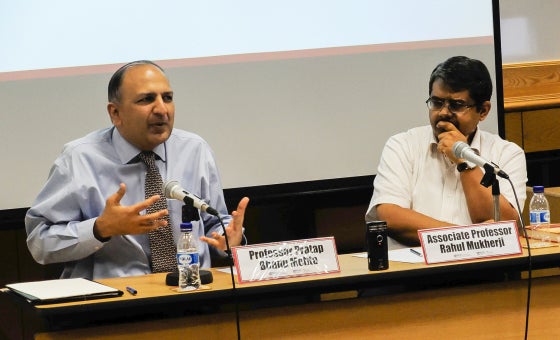
| Event Title: | ISAS Joint Seminar |
| Topic: | India's Supreme Court: From Law to Governance? |
| Date/Time: | 19 November 2014 | 00:00 - 09:39 |
| Venue: | AS7, #01-17 Faculty of Arts and Social Sciences, National University of Singapore |
| Speaker/s: | Prof Pratap Mehta, President, Centre for Policy Research, India |
| Description: | This talk will examine the evolution of India's Supreme Court into an institution of governance and what it implies for the rule of law in India. |
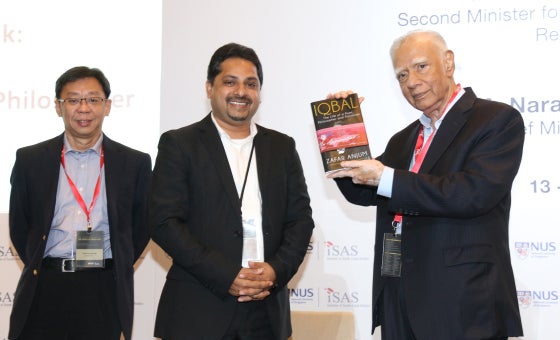
| Event Title: | Book Launch |
| Topic: | The Life of IQBAL, Zafar Anjum |
| Date/Time: | 14 November 2014 | 00:00 - 09:39 |
| Venue: | Grand Corpthorne |
| Speaker/s: | Dr Iftekhar Chowdhury Mr PN Balji Mr Zafar Anjum |
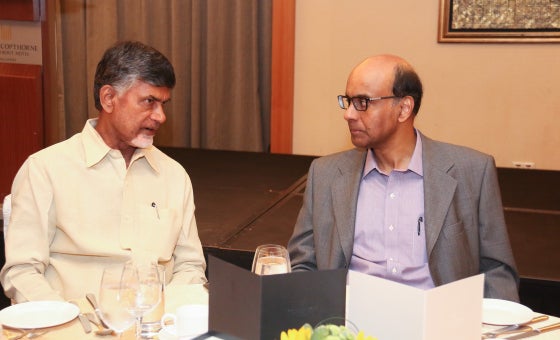
| Event Title: | Business Luncheon |
| Topic: | HCI-ISAS Business Luncheon |
| Date/Time: | 14 November 2014 | 00:00 - 09:39 |
| Venue: | Grand Copthorne Waterfront Hotel Galleria Ballroom, Level 3 |
| Speaker/s: | Multiple Speakers |
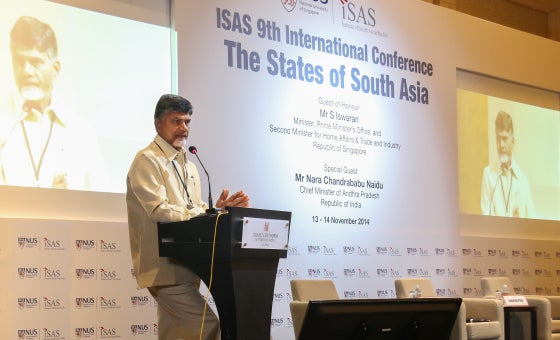
| Event Title: | Conference |
| Topic: | ISAS 9th International Conference |
| Date/Time: | 13 November 2014 | 00:00 - 09:39 |
| Venue: | Grand Copthorne Waterfront Hotel Grand Ballroom, Level 4 |
| Speaker/s: | Multiple Speakers |
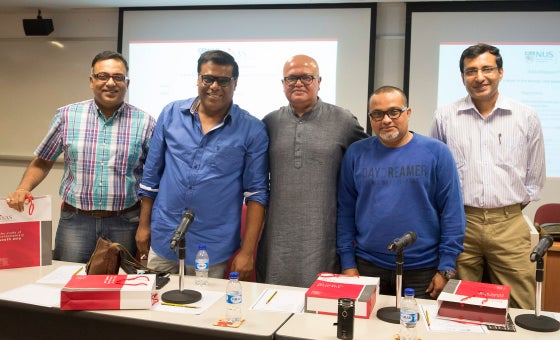
| Event Title: | ISAS-Darpan Panel Discussion |
| Topic: | "A Walk in the Woods: The Rebirth of Regional Cinema of India" |
| Date/Time: | 31 October 2014 | 00:00 - 09:39 |
| Venue: | Seminar Room 5-4 (BB-05-01) National University of Singapore (Bukit Timah Campus) |
| Speaker/s: | Mr Sharib Hashmi, Mr Ashish Vidyarthi, Mr Ravi Jhadhav , Mr Ravi Sharma |

| Event Title: | Darpan Symposium |
| Topic: | Darpan Symposium |
| Date/Time: | 31 October 2014 | 00:00 - 09:39 |
| Venue: | Seminar Room 5-4 (BB-05-01) National University of Singapore (Bukit Timah Campus) |
| Speaker/s: | Mr Sharib Hashmi Mr Ashish Vidyarthi Mr Ravi Jhadhav Mr Ravi Sharma |

| Event Title: | SASP-ISAS Seminar |
| Topic: | Interrogating the Education Policy Game in India: institutions, mental models, marginalities, and the imaginary |
| Date/Time: | 29 October 2014 | 00:00 - 09:39 |
| Venue: | Malay Studies, AS7 #04-13, Kent Ridge Campus, NUS |
| Speaker/s: | Dr. Prachi Srivastava (ISAS) |
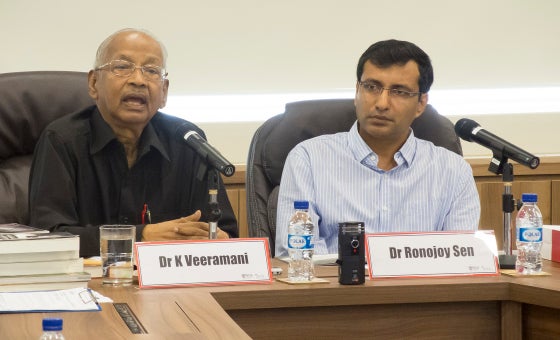
| Event Title: | Seminar |
| Topic: | The Impact of Periyar E.V.RÔÇÖs Visits to Southeast Asia |
| Date/Time: | 28 October 2014 | 00:00 - 09:39 |
| Venue: | ISAS Board Room |
| Speaker/s: | Dr. K. Veeramani, Chancellor, Periyar Maniammai University |
| Description: | Periyar E.V.Ramasami, popularly known as ÔÇ£Thanthai PeriyarÔÇØ, visited Malaya twice which includes Singapore in the years 1929 and 1954. He also visited the then Burma, presently ÔÇÿMyanmarÔÇÖ in 1954. He accepted various public receptions in these countries and participated in the conferences and meetings held there. He has also exhorted the Tamil Community to join the national mainstream and become good citizens to promote social harmony with other communities. The impact was very great. Persons like TAMILAVEL K.SARANGAPANI, the Founder of Tamil Murasu daily were his notable disciples. His visits are responsible for attitudinal changes among the people of these countries. He insisted in reshaping their lives with new vision and education. |
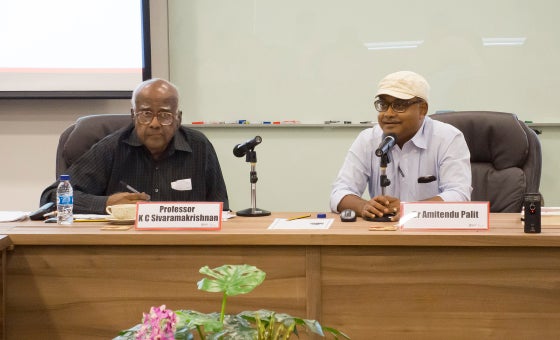
| Event Title: | Seminar |
| Topic: | Mega-city situation in India and the contextual relevance with the Andhra Pradesh experience |
| Date/Time: | 20 October 2014 | 00:00 - 09:39 |
| Venue: | ISAS Board Room |
| Speaker/s: | Prof K C Sivaramakrishnan, Chairman , Centre for Policy Research, New Delhi, India |
| Description: | There is a fascination about megacities in India induced more by concentration of high rises in parts of the city, shopping malls, metro lines and ceaseless traffic jams. There is no official definition of metropolitan cities or megacities available in the census though urban agglomerations with more than 10 million people is referred at times to by the Census as megacities. A recent study by the Centre for Policy Research, to be published soon as a book ("Governance of Megacities: Fractured Thinking, Fragmented setupÔÇØ by K C Sivaramakrishnan: Oxford University Press) covers five of the cities Kolkata, Mumbai, Bangalore, Hyderabad and Chennai. This talk will focus on the various experiences and issues surrounding mega-cities in India and will, in this context, further focus on the experience of selecting a new capital for the restructured state of Andhra Pradesh in India. |
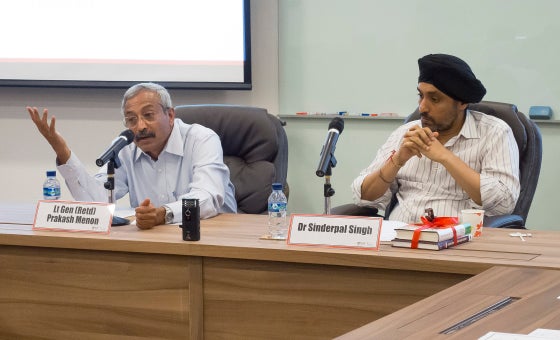
| Event Title: | Seminar |
| Topic: | IndiaÔÇÖs Counter-Terrorism Experience |
| Date/Time: | 17 October 2014 | 00:00 - 09:39 |
| Venue: | ISAS Board Room |
| Speaker/s: | Lt Gen (Retd) Prakash Menon, The Indian Army |
| Description: | IndiaÔÇÖs counter-insurgency experience provides some insights about confronting the increased lethality acquired by small groups through the use of technology and violence as a means to intimidate the population. Increased lethality, combined with information and communication technology, has empowered individuals or small groups of people to inflict destruction on a scale that has never been witnessed before. The improvised explosive device (IED) remotely detonated; the suicide bomber; and the potential of cyber-attacks by individuals or small groups of both state and non-state actors are some of the manifestations of the lethality revolution. The Indian experience suggests that increased lethality calls for greater caution when reacting to diabolic acts of violence. The reaction must preserve the imperative of avoiding alienation of the population. Such restraint is politically challenging, and voices of revenge can easily subdue the voices of reason. Political logic would trump strategic wisdom, and this represents the nature of the challenge. |
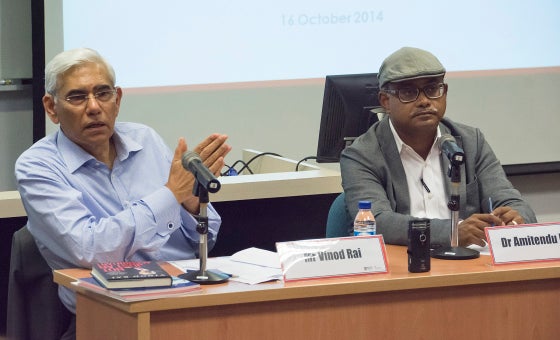
| Event Title: | Seminar |
| Topic: | Role of transparency and Accountability in Ethical Governance |
| Date/Time: | 16 October 2014 | 00:00 - 09:39 |
| Venue: | Seminar Room 5-4 (BB-05-01) National University of Singapore (Bukit Timah Campus) |
| Speaker/s: | Mr Vinod Rai, Former Comptroller & Auditor General of India |
| Description: | Mr Vinod Rai would present extracts from his recently launched book on "Not Just an Accountant". He will shed light on some of the major scams that shook the country in the recent past. Mr Rai in discussing procedural irregularities, last minute quick fixes and crony capitalism in several high profile cases, exposes government malfeasance and probes the mandate of the Comptroller and Auditor General's office as a watchdog. He will also discuss long-term solutions to corruption and articulate the urgent need for transparency, probity, accountability and ethics. |
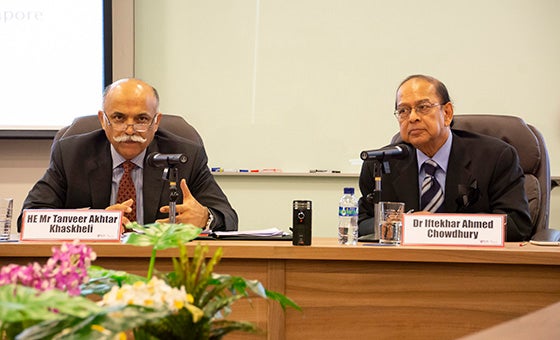
| Event Title: | ISAS Ambassador Lecture Series |
| Topic: | "Pakistan Economic Potentials" |
| Date/Time: | 30 September 2014 | 00:00 - 09:39 |
| Venue: | ISAS Board Room |
| Speaker/s: | H.E. Mr Tanveer Akhtar Khaskheli, Pakistan High Commissioner to Singapore |
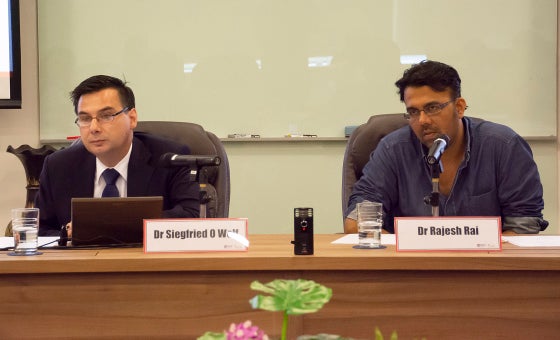
| Event Title: | Seminar |
| Topic: | Hindu Nationalism as a Social Movement and its lead up to Contemporary Politics |
| Date/Time: | 30 September 2014 | 00:00 - 09:39 |
| Venue: | ISAS Board Room |
| Speaker/s: | Dr Siegfred Wolf, South Asia Institute, Department of Political Science Heidelberg University, Heidelberg, Germany; and Director, Research South Asia Democratic Forum/SADF, Brussels, Belgium |
| Description: | One of the most noteworthy developments in recent Indian politics is the return of the Hindu-Nationalist movement into power through a landslide victory in the 2014 general elections. This is gaining significance, since the occurrence of the phenomenon Hindu-Nationalism, also often described as Hindu fundamentalism or Hindu-chauvinism, is portrayed by many observers as the greatest threat towards IndiaÔÇÖs democracy as well as a major challenge for peace and stability in the South Asian region. The presentation will argue, that the rise of the Bharatiya Janata Party (BJP), as the main political representative of the Hindu-Nationalists, revealed an existential dilemma of the entire Hindu-Nationalist movement. Like most of the political parties, the BJP had to deal with the balancing act of harmonizing visions, the ideology and every day politics. Internal conflicts over leadership, the lack of intra-party democratic mechanisms as well as personality conflicts and struggles over leadership, all had a negative impact on the (whole) Hindu-Nationalist movement, especially on the political-parliamentarian wing of the BJP and has led to an erosion of power, which manifested itself in a defeat in the elections in 2004 and 2009, threatening the partyÔÇÖs survival. |
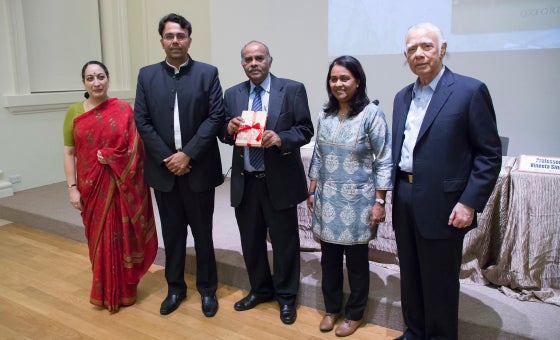
| Event Title: | SASP-ISAS Book Launch |
| Topic: | Indians in Singapore, 1819-1945: Diaspora In The Colonial Port-City" Book by Dr Rajesh Rai |
| Date/Time: | 26 September 2014 | 00:00 - 09:39 |
| Venue: | The Salon National Museum Singapore |
| Speaker/s: | Launched by Amb K. Kesavapany, President, Singapore Indian Association; and Distinguished Affiliated Fellow, ARI- NUS |
| Description: | Published by Oxford University Press, 'Indians in Singapore, 1819 -1945: Diaspora in the Colonial Port-City', is a comprehensive study of the Indian diaspora in colonial Singapore. Drawing on administrative archives, intelligence reports, observer accounts, newspapers and oral testimonies, the book provides a meticulous historical account of the formation of the diaspora in the colonial port-city, and its socio-political, religious and cultural development from the advent of British colonial rule to the end of the Japanese occupation. This book will be of considerable interest to scholars and students of modern South Asia, history of diaspora, anthropology, sociology, and cultural studies. |
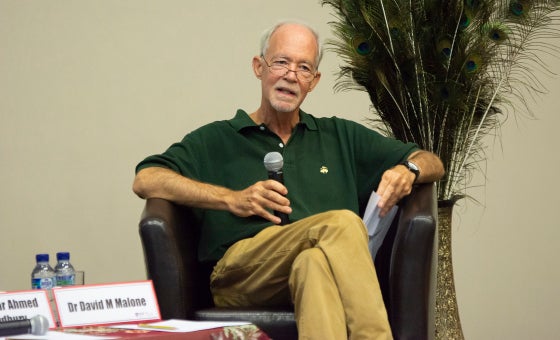
| Event Title: | Seminar |
| Topic: | Priority Bilateral and Plurilateral Relations for India |
| Date/Time: | 18 September 2014 | 00:00 - 09:39 |
| Venue: | UNDP Plenary Room |
| Speaker/s: | Dr David Melone, Under-Secretary General, United Nations; and Rector, United Nations University, Japan |
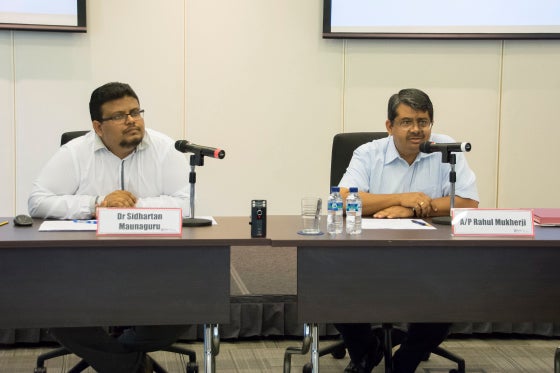
| Event Title: | ISAS Closed Door Seminar |
| Topic: | Sovereign Deity and Notions of Belonging: Contesting Spaces, Hindu Temples and Tamils in the UK |
| Date/Time: | 17 September 2014 | 00:00 - 09:39 |
| Venue: | ISAS Board Room |
| Speaker/s: | Prof Sidharthan Maunaguru, Assistant Professor, South Asian Studies Programme, National University of Singapore |

| Event Title: | ISAS Book Launch and Panel Discussion |
| Topic: | India's Socio-Economy: What's Up? What's Down? |
| Date/Time: | 12 September 2014 | 00:00 - 09:39 |
| Venue: | Dining Room, Level 14 Administration Building Singapore Management University |
| Speaker/s: | H.E. Vijay Thakur Singh, Ambassador of India to Singapore Mr Vikram Khanna, Associate Editor, The Business Times Assoc Prof Rahul Mukherji (ISAS) Dr T Chandroo, Executive Officer, Modern Montessori International Pte Ltd |
| Description: | India's Prime Minister Narendra Modi completed his first three months in office on 25 August 2014. During his election campaign, he had promised sweeping market reforms to revive India's economy, which had slowed down at an alarming rate, and put the country back in order. He had consistently criticised the United Progressive Alliance government for years of waste and policy paralysis. He had also promised the development of a regime of "minimum government and maximum governance" that would unshackle key sectors of the economy from the state. However, Prime Minister Modi's admirers seemed to be dismayed his government's performance thus far. Among others, he promised new roads, factories, high-speed trains, power lines and even 100 new cities. So far, there has been little movement on any of these gigantic tasks. Similarly, there have been no signs of the promised change at institutions sapped by graft and over-regulation that many Indians have grown to revile. He also refrained from cutting food aid, which cost an estimated one percent of gross domestic product, or tackling costly welfare programmes. While the Modi government has a five-year term to achieve its goal of transforming India into an economic power, some economists argue that the momentum is lost. Is the momentum really lost? What are some of the key socio-economic issues facing the Modi government? How has it fared thus far in dealing with these issues? What else needs to be done? These are some of the questions that weigh heavily on the minds of business analysts and India watchers. Singapore Management University brings together a panel of distinguished experts from the academic and business communities, and the media that will share its insights on these and many of other questions on the socio-economic environment in India. |
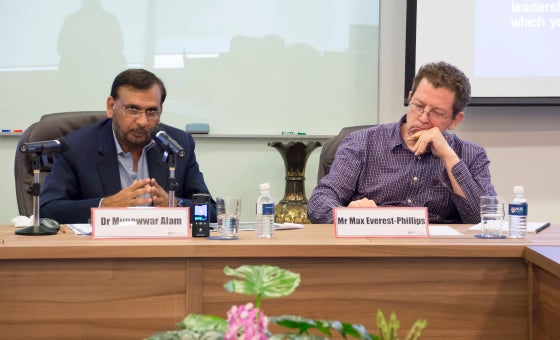
| Event Title: | ISAS-UNDP-GCPSE Joint Seminar |
| Topic: | Integrating Decentralisation with Civil Service Reforms: Did it Work? Experience from Pakistan |
| Date/Time: | 12 September 2014 | 00:00 - 09:39 |
| Venue: | ISAS Board Room |
| Speaker/s: | Dr Munawwar Alam, Adviser at the Commonwealth Local Government Forum |
| Description: | Pakistan's governance problems are enormous. Its political history is marred with intermittent military rules cumulatively equivalent to civilian rule. While it is passing through democratic transition, it faces challenges of international terrorism compounded with a plethora of developmental issues. Amidst this scenario, there are lessons to be learnt from Pakistan's sporadic attempts to reform its system of governance. For instance, all military regimes strengthened local democracy vis-?á-vis civilian governments when it is relegated to non-participatory, non-elected structure run by the civil servants. While every military government introduced its own brand of local government, the Devolution of Power Plan introduced by General Pervez Musharraf in 2001 was not simply another local government system, per se, but a major attempt to reform public service through a comprehensive package of reforms that integrated decentralisation with civil service (police and bureaucracy) ' all aimed at modernization and social change in the society. As such it was a bold initiative after 54 years to change the governance paradigm inherited from colonial administration in the un-divided India. The Devolution Plan provides a deeper understanding of core governance issues in Pakistan especially the actors of political economy of local governance including Pakistan's civil bureaucracy. One needs to understand that in the context of Pakistan, reform of the civil service and police service is crucial, as firstly they are part of the elite cadre, and more importantly with insurmountable powers are key actors in political, administrative, governance and social contexts. |
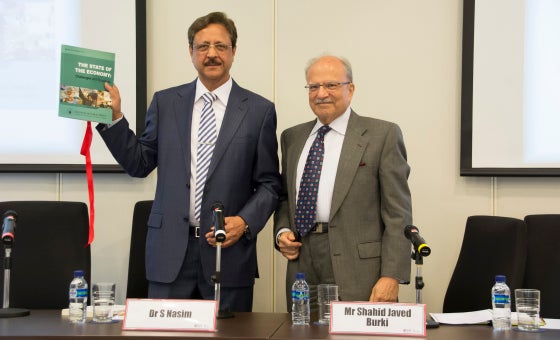
| Event Title: | ISAS Book Launch and Panel Discussion |
| Topic: | The State of the Economy: Challenges & Responses |
| Date/Time: | 29 August 2014 | 00:00 - 09:39 |
| Venue: | MEI Conference Room |
| Speaker/s: | multiple speaker |
| Description: | The State of the Economy: Challenges and Opportunity, the seventh annual report of the Lahore-based Institute of Public Policy is based on two assumptions. The authors believe that while 2013/14 was a very difficult year for Pakistan "perhaps the most difficult it has faced in its 67 year history " it came not only with challenges but also with opportunities. The report argues that it is the job of the policymakers to recognize the first and to use the second to chart a different course for the country. The report was authored by Shahid Javed Burki and Parvez Hasan, former World Bank officials. |

| Event Title: | Panel Discussion |
| Topic: | Discussion on Pakistan' Economy - Challenge & Responses |
| Date/Time: | 29 August 2014 | 00:00 - 09:39 |
| Venue: | MEI Conference Room |
| Speaker/s: | Mr Shahid Javed Burki (ISAS) Dr Iftekhar Chowdhury (ISAS) Prof Riaz Hassan (ISAS) Prof Rahul Mukherji (ISAS) |
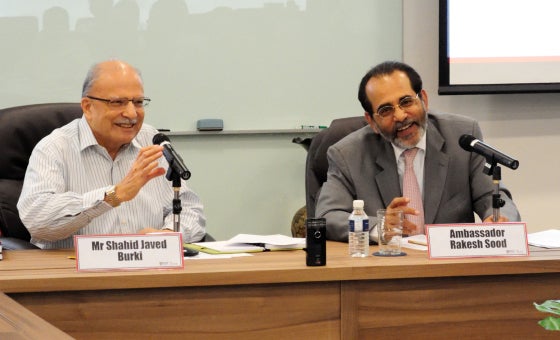
| Event Title: | ISAS Closed Door Discussion |
| Topic: | PM Modi's Foreign Policy Agenda |
| Date/Time: | 26 August 2014 | 00:00 - 09:39 |
| Venue: | ISAS |
| Speaker/s: | Amb Rakesh Sood, India's former Special Envoy for Disarmament and Non-Proliferation |
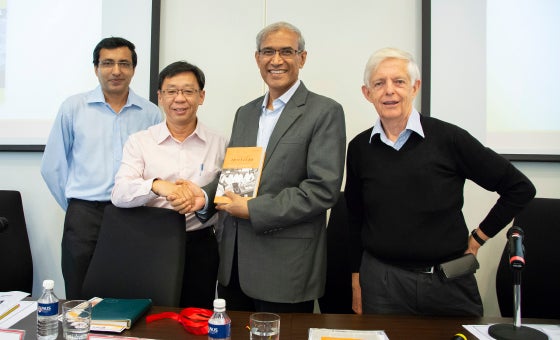
| Event Title: | ISAS Book Launch and Panel Discussion |
| Topic: | Being Muslim in South Asia: Diversity and Daily Life |
| Date/Time: | 22 August 2014 | 00:00 - 09:39 |
| Venue: | MEI Conference Room |
| Speaker/s: | multiple speakers |
| Description: | The 500 million Muslims who live in Pakistan, India, Bangladesh, and Sri Lanka constitute roughly one-third of the world's Muslims. Their lives in the twenty-first century are challenging and diverse. Too often in recent years, they have been unfairly associated with terrorism, as anyone with a Muslim name who has passed through a Western airport will attest. But South Asian Muslims do what other people do: they educate their children, earn livings, travel widely, discuss their faith, settle disputes, arrange marriages, cope with politics, struggle with governments, and support football teams. United by shared adherence to the Holy Quran and the teachings of the Prophet Muhammad, Muslims of South Asia speak numerous languages, follow different local customs, and have varied aspirations for their own lives and those of their children. The essays in this book probe such aspects of Muslim life. The authors- concerns range from great political debates that have affected Muslim lives to marriage on the east coast of Sri Lanka, schools and media in Pakistan, women's groups in Bangladesh, and football teams in Kolkata. This work will interest readers who wish to discover the multi-faceted lives of South Asia's Muslims. |
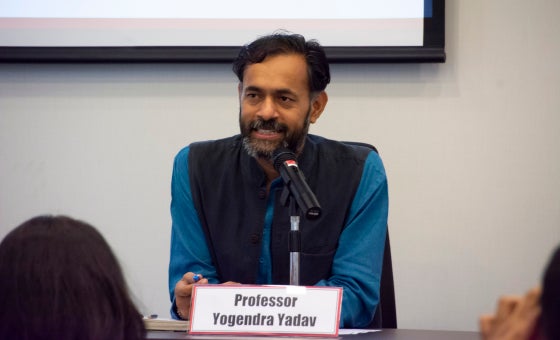
| Event Title: | Seminar |
| Topic: | Politics of Social Movement: Reflections on the Aam Aadami Party Experience in India |
| Date/Time: | 22 August 2014 | 00:00 - 09:39 |
| Venue: | MEI Conference Room |
| Speaker/s: | Prof Yogendra Yadav, Member and Chief Spokesperson, AAP Political AffairsÔÇÖ Committee |
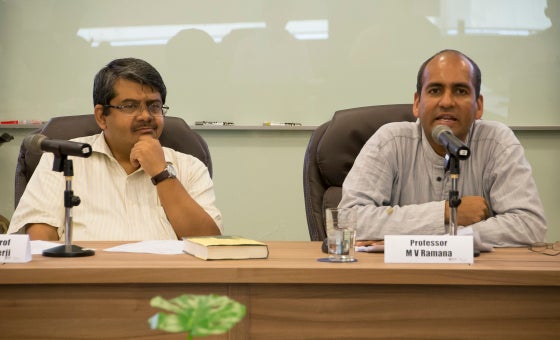
| Event Title: | Seminar |
| Topic: | Nuclear Energy in India: Historial Record and Future Prospects |
| Date/Time: | 19 August 2014 | 00:00 - 09:39 |
| Speaker/s: | Prof M.V Ramana, Woodrow Wilson School of Public and Inter-national Affairs, Princeton University |
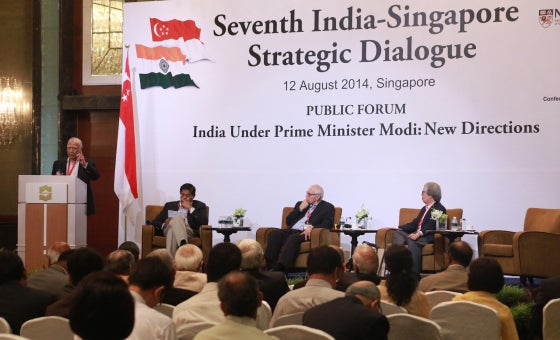
| Event Title: | Public Symposium |
| Topic: | "India Under Prime Minister Modi: New DirectionsÔÇØ |
| Date/Time: | 12 August 2014 | 00:00 - 09:39 |
| Speaker/s: | Ambassador Tommy Koh Mr Jamshyd N Godrej Mr Gautam Thapar Mr Gautam Banerjee Ambassador Hardeep Singh Puri Professor Kishore Mahbubani Mr B J Panda Ambassador Gopinath Pillai |
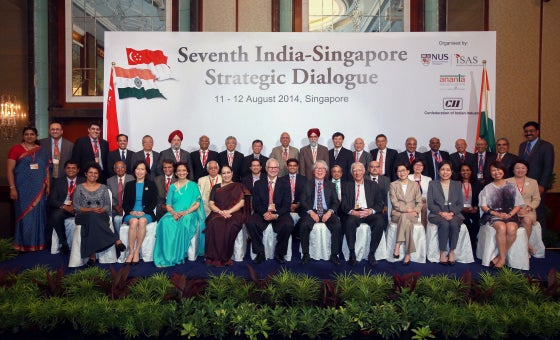
| Event Title: | Dialogue |
| Topic: | 7th India-Singapore Strategic Dialogue |
| Date/Time: | 11 August 2014 | 00:00 - 09:39 |
| Venue: | Shangri-La Hotel |
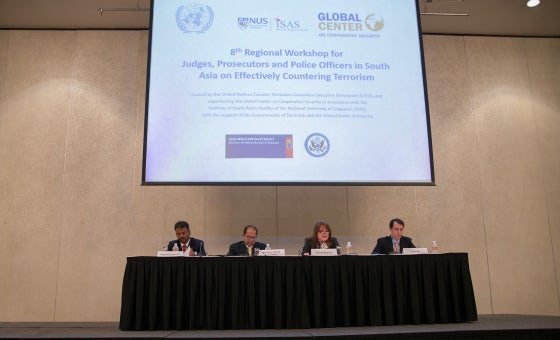
| Event Title: | ISAS Forum |
| Topic: | Modi Government Imperatives & Challenges |
| Date/Time: | 25 July 2014 | 00:00 - 09:39 |
| Venue: | Orchard Hotel |
| Speaker/s: | multiple speakers |
| Description: | The recent Indian elections gripped the world by the sheer scale of the democratic process and unambiguous verdict in favour of the new government. The moves and measures of the newly-elected National Democratic Alliance (NDA) led by the BJP, and with Mr Narendra Modi as the new Prime Minister, has been under the spotlight since it assumed office a month ago. This forum hosted by the Institute of South Asian Studies at National University of Singapore will bring together some of the most eminent experts on India to debate the challenges and imperatives for India and the new government. What should investors be doing to capture the opportunities? Attendees will receive insights from eminent speakers who have their pulse on the Indian economy, politics and other domestic and external issues of significance for the country. The forum will address the pressing issues facing PM ModiÔÇÖs Government on economics, politics, security and foreign policy. It will deliberate on the likely changes in the character of the Indian polity following the resounding victory of the BJP in the general elections. |
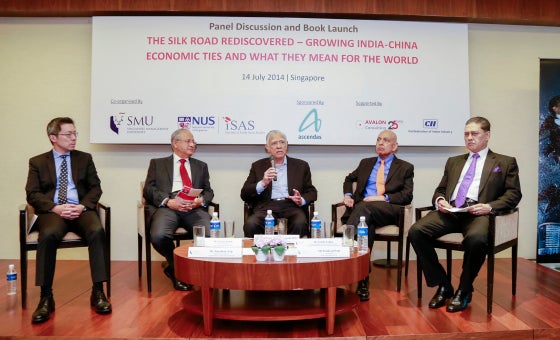
| Event Title: | ISAS Book Launch and Panel Discussion |
| Topic: | The Silk Road Rediscovered: Growing China-India Economic Ties and What They Mean For the World |
| Date/Time: | 14 July 2014 | 00:00 - 09:39 |
| Venue: | Singapore Management University |
| Speaker/s: | Multiple Speakers |

| Event Title: | ISAS Book Launch and Panel Discussion |
| Topic: | The State of the Economy: Challenges & Responses |
| Date/Time: | 11 July 2014 | 00:00 - 09:39 |
| Venue: | MEI Conference Room |
| Speaker/s: | Mr Shahid Javed Burki (ISAS), Dr Iftekhar Chowdhury (ISAS), Prof Riaz Hassan (ISAS) Prof Rahul Mukherji (ISAS) |
| Description: | The State of the Economy: Challenges and Opportunity, the seventh annual report of the Lahore-based Institute of Public Policy is based on two assumptions. The authors believe that while 2013/14 was a very difficult year for Pakistan-perhaps the most difficult it has faced in its 67 year history - it came not only with challenges but also with opportunities. The report argues that it is the job of the policymakers to recognize the first and to use the second to chart a different course for the country. The report was authored by Shahid Javed Burki and Parvez Hasan, former World Bank officials. |
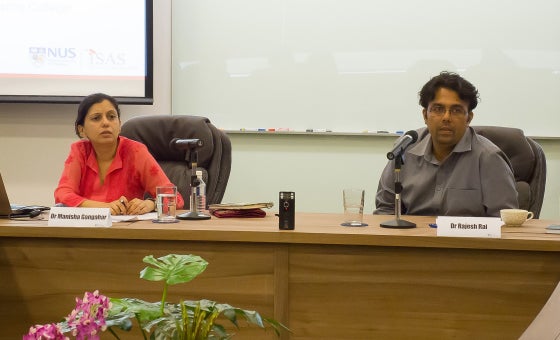
| Event Title: | SASP-ISAS Joint-Seminar |
| Topic: | Kashmir Conumdrum: Identity, Violence and Memory |
| Date/Time: | 03 July 2014 | 00:00 - 09:39 |
| Venue: | ISAS Board Room |
| Speaker/s: | Dr Manisha Gangahar, Assistant Professor, Goswami Ganesh Dutta Sanatan Dharma College |
| Description: | More than six decades and this question-whether Kashmir is, was or can be, an integral part of India?'can still stir passionate debates and violent protests on the streets. The territory is disputed, but can one say that the identity is not? What defines being an 'Indian' or being a 'Kashmiri'? The question of identity can consume lives and erase communities. In this seemingly tug-and-pull of homogenisation and fragmentation, as a result of a troubled history, political blunders and alliances, more than discovering a meaning, it is identity politics that a Kashmiri is found caught in. Since the Valley became a conflict zone, much of the social and political life has turned into questions of recognition and identity poses a quandary. And, when identity is comprehended as something that comes from the outside rather than something discovered as having existed within, narratives become essential in providing a sense of identity. Through the reading of narratives from and about Kashmir, the speaker seeks to explore how ordinary people negotiate spaces in their lives in a conflict zone. Peace is a befuddling word in Kashmir, not easily understood and even more difficult to explain. There is, of course, no one way of looking at one's identity and when concepts like 'nation', 'religion' and 'region' come into play to shape up the idea of 'self', it becomes more complex and problematic. While each offers a sense of identity and belonging, the concepts are equally capable of leading to an identity crisis and Kashmiri identity has been its victim. Beyond the documented and archived facts is a landscape that is deeply personal and it is through these personal accounts that emerges the primacy of memory and its capacity to provide a meaning. The author explores how the way in which one remembers and narrates the past reflects the ways in which identity are implicated in the present. |
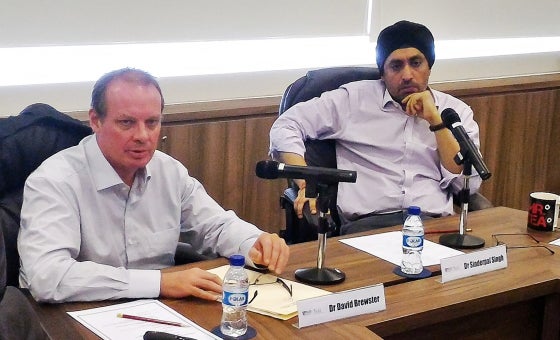
| Event Title: | Seminar |
| Topic: | Dividing Lines: Our Evolving Mental Maps of the Bay of Bengal |
| Date/Time: | 16 June 2014 | 00:00 - 09:39 |
| Venue: | ISAS Board Room |
| Speaker/s: | Dr David Brewster, Strategic and Defence Studies Centre, Australian National University |
| Description: | In April 1942 a seemingly invincible Japanese army stood at IndiaÔÇÖs eastern border after having conquered Myanmar in the space of weeks. The British Army had been routed and the British Fleet withdrew to Africa - the gates of India lay open. But the Japanese Army stopped where it was and never tried to overthrow the British Raj. Underlying their decision to stop at IndiaÔÇÖs border was the fact that JapanÔÇÖs leaders did not see the Bay of Bengal to be a single strategic entity ÔÇô rather, there was a dividing line between their ÔÇ£mental mapÔÇØ of what constituted Asia and the Indian subcontinent beyond. Our mental maps of the world, including our perceptions of where regions begin and end, can have a profound impact on strategic behaviour. For decades there has been a sharp division between what we understand to be the regions of South Asia and Southeast Asia. The line between them effectively cuts the Bay of Bengal in two. These perceptions have inhibited a proper analysis of the strategic dynamics of the area. The rise of India and the re-conceptualisation of the ÔÇ£Indo-PacificÔÇØ makes the Bay of Bengal increasingly matter as a strategic space. Like, the South China Sea, it is necessary understand the Bay as a coherent space in order to properly understand its strategic problems and dynamics. |
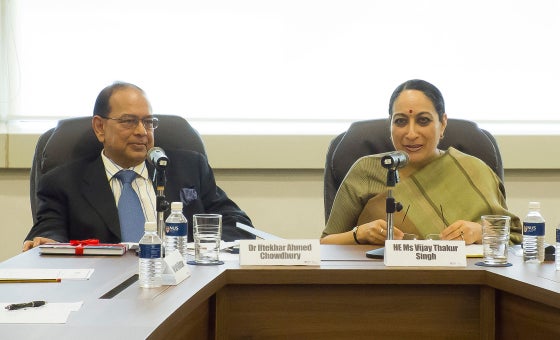
| Event Title: | ISAS Ambassador Lecture Series |
| Topic: | Opportunities Opening up in Emerging India |
| Date/Time: | 14 May 2014 | 00:00 - 09:39 |
| Venue: | ISAS Board Room |
| Speaker/s: | HE Vijay Thakur Singh, Indian High Commissioner to Singapore |
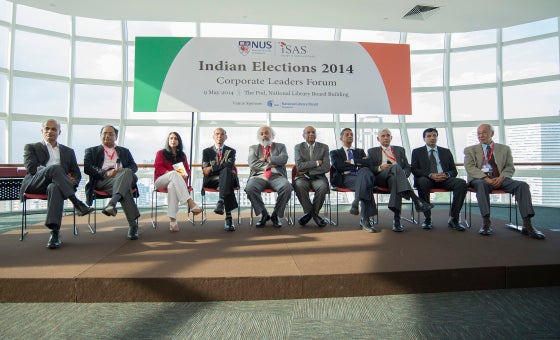
| Event Title: | Forum |
| Topic: | Corporate Leaders Forum on Indian Elections 2014 |
| Date/Time: | 09 May 2014 | 00:00 - 09:39 |
| Venue: | The Pod, Level 16, National Library Board |
| Speaker/s: | multiple speakers |
| Description: | The objective of the forum is to provide influencers and decision-makers an understanding of the Indian electoral process and the implications of a prospective change in government. The forum will discuss the emerging political landscape, impact on governance and leadership and its implications for business and industry. We have invited Ambassador Shyam Saran, Chairman, National Security Advisory Board, Dr Subhir Gokarn of Brookings India, Mr Vinod Rai, former Auditor General of India and Dr Duvvuri Subbarao, former Governor of Reserve Bank of India (RBI) amongst other speakers. The forum will include ISAS perspectives on the electoral outcomes and a special segment on media perspectives by Mr Manu Joseph, Columnist of New York Times and Mr Ravi Velloor, Foreign Editor of Singapore Press Holdings. |
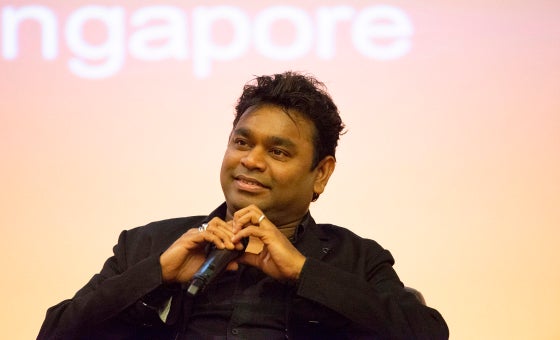
| Event Title: | ISAS Panel Discussions |
| Topic: | ISAS Student Outreach: Live Interaction with Oscar Winning Musician and Composer A R Rahman |
| Date/Time: | 29 April 2014 | 00:00 - 09:39 |
| Venue: | Auditorium 2 @ Stephen Riady Centre, University Town (UTown) |
| Speaker/s: | Shabir Tabare Alam,CEO of Shabir Music Academy of Contemporary Music; Mr A R Rahman, Oscar Winning Musician and Composer |

| Event Title: | ISAS Book Launch |
| Topic: | Being Muslim in South Asia: Diversity and Daily Life |
| Date/Time: | 28 April 2014 | 00:00 - 09:39 |
| Venue: | Lecture Hall, India International Centre, New Delhi |
| Speaker/s: | multiple speakers |
| Description: | The 500 million Muslims who live in Pakistan, India, Bangladesh, and Sri Lanka constitute roughly one-third of the world's Muslims. Their lives in the twenty-first century are challenging and diverse. Too often in recent years, they have been unfairly associated with terrorism, as anyone with a Muslim name who has passed through a Western airport will attest. But South Asian Muslims do what other people do: they educate their children, earn livings, travel widely, discuss their faith, settle disputes, arrange marriages, cope with politics, struggle with governments, and support football teams. United by shared adherence to the Holy Quran and the teachings of the Prophet Muhammad, Muslims of South Asia speak numerous languages, follow different local customs, and have varied aspirations for their own lives and those of their children. The essays in this book probe such aspects of Muslim life. The authors concerns range from great political debates that have affected Muslim lives to marriage on the east coast of Sri Lanka, schools and media in Pakistan, women's groups in Bangladesh, and football teams in Kolkata. This work will interest readers who wish to discover the multi-faceted lives of South Asia's Muslims. |

| Event Title: | ISAS Book Launch |
| Topic: | Being Muslim in South Asia |
| Date/Time: | 28 April 2014 | 00:00 - 09:39 |
| Venue: | Lecture Hall, India International Centre, New Delhi |
| Speaker/s: | Keynote and Launched by Mr Mohammad Hamid Ansari Vice President, Republic of India |
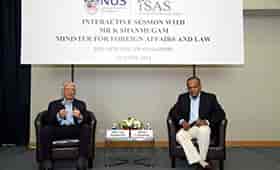
| Event Title: | ISAS Interactive Session |
| Topic: | ISAS Interactive Session with Mr K Shanmugam, Minister for Law & Foreign Affairs, Republic of Singapore |
| Date/Time: | 22 April 2014 | 00:00 - 09:39 |
| Venue: | Plenary Room, Block A, Level 8, 29 Heng Mui Keng Terrace |
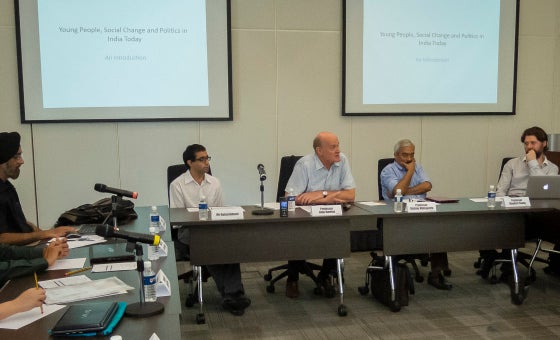
| Event Title: | Workshop |
| Topic: | Youth, Social Change and Politics in India Today |
| Date/Time: | 16 April 2014 | 00:00 - 09:39 |
| Venue: | MEI Conference Room |
| Speaker/s: | Prof John Hariss (ISAS) , Mr Rahul Advani (ISAS) |
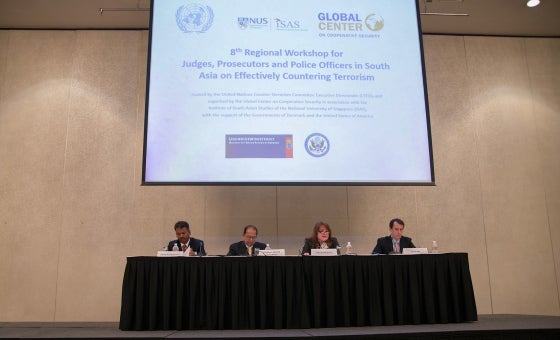
| Event Title: | CGCC-ISAS Workshop |
| Topic: | 8th Regional Workshop for Judges, Prosectutors and Police Officers in South Asia on Effectively Countering Terrorism |
| Date/Time: | 15 April 2014 | 00:00 - 09:39 |
| Venue: | Orchard Hotel Singapore |
| Speaker/s: | Dr Iftekhar Chowdhury (ISAS) Ms. Elizabeth Joyce, Chief of Section, CTED |
| Description: | 8th Regional Workshop for Judges Prosecutors and Police Officers in South Asia on Effectively Countering Terrorism The three-day South Asian Regional Workshop for Judges, Prosecutors and Police Officers in South Asia on Effectively Countering Terrorism concluded successfully on 17 April 2014. The workshop was hosted by the United Nations Counter-Terrorism Committee Executive Directorate (CTED), and organized by the Global Center on Cooperative Security in association with the Institute of South Asian Studies of the National University of Singapore (ISAS), with the support of the Governments of Denmark and the United States of America. There were some 60 overseas participants including 3 Supreme Court Judges, UN officials, as well Resource persons from the US, UK, Australia, Singapore (ISAS), and Pakistan. Senior personnel from all these three legal branches from India, Pakistan, Bangladesh, Sri Lanka, Nepal, Maldives and Bhutan were present. The workshop was held at the Orchard Hotel, funded by the US and Denmark. ISAS hosted a dinner reception for the participants at WAVE HOUSE Restaurant at Sentosa. Kick-starting the initial plenary session, the workshop broke into three working groups of judges, prosecutors, and police officers. Each group intensively deliberated on the basis of written agenda for three days. At the final day at the wrap-up plenary, representatives of each presented reports which were discussed interactively. Dr Iftekhar Chowdhury, Principal Research Fellow, ISAS who was the designated resource person for the workshop concluded eight ÔÇÿtake-awaysÔÇÖ at the closing session. There was consensus that given common British roots of the legal tradition in South Asia, there was great scope for cooperation, starting from the level of practitioners in the field, working up to policymakers. New technologies required continued training for the legal machinery. The regional experiences can and should be collated, studied, and analysed and the best practices shared. There was need to update the Criminal Procedure Code, the Penal Code and the Evidence Act (Parliamentarians in due course would be involved) in response to changing needs. The UN should provide necessary technical assistance and support towards further capacity-building. The GCCS had prepared Certificates for all participants, which Dr Iftekhar Chowdhury, Principal Research Fellow, ISAS presented to all participants. The next event, partnered between ISAS and the Global Centre is scheduled for early December. That session will focus on the civil society, as opposed to public officials, as in this one. ISAsÔÇÖ role in this partnership was mentioned with gratitude by the UN Officials and the GCCS reps. |
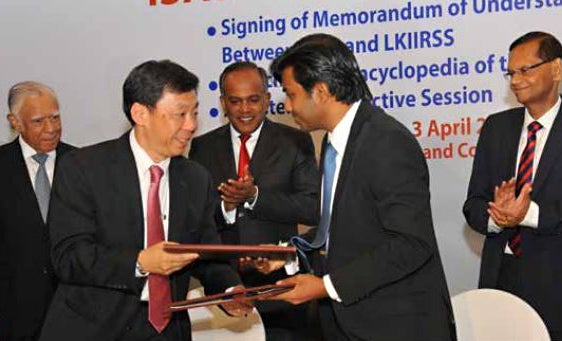
| Event Title: | ISAS Colombo Colloquium |
| Topic: | MOU Signing between ISAS and LKIIRSS |
| Date/Time: | 03 April 2014 | 00:00 - 09:39 |
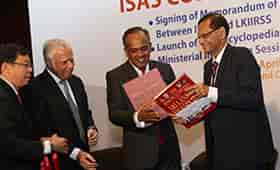
| Event Title: | Colombo Colloquim |
| Topic: | ISAS Colombo Colloquim |
| Date/Time: | 03 April 2014 | 00:00 - 09:39 |
| Venue: | CINNAMON GRAND COLOMBO Colombo 03, Sri Lanka |
| Speaker/s: | Prof Tan Tai Yong Amb Gopinath Pillai Minister K Shanmugam Minister Prof G.L. Peiris Mr Abeyagoonasekera |
Load more


